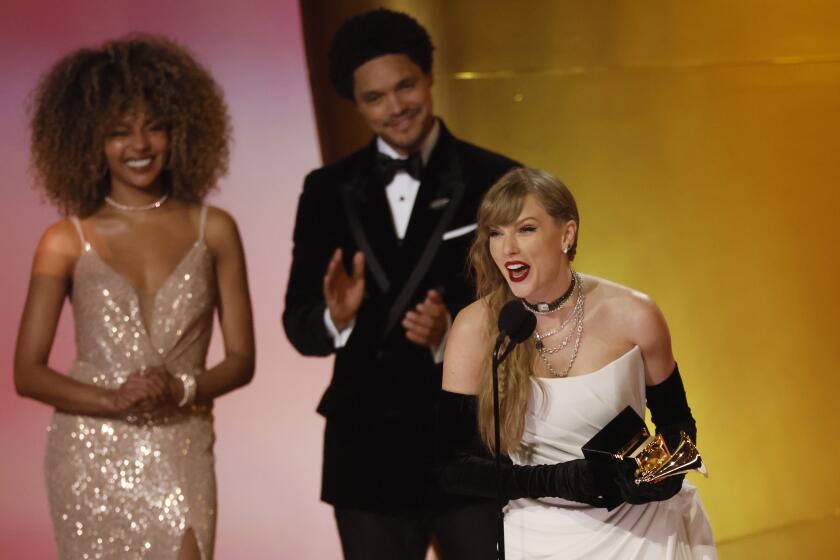Portishead Weaves Sonic Tapestries
- Share via
The electronics-drenched music of Portishead radiates modern detachment, even as Beth Gibbons’ singing resonates with the forlorn vulnerability of someone seeking reassurance that she’s not alone in her feelings.
The fans packed into the Hollywood Palladium for the English group’s concert on Thursday responded eagerly to this introverted way of reaching out, showing Gibbons that they did, indeed, understand.
Throughout the 90-minute set, this small, unprepossessing woman served as the eye of an emotional maelstrom, channeling through her tiny form and impossibly huge voice all the melancholy, yearning and barely restrained fury of the band’s two albums, 1994’s groundbreaking “Dummy” and this year’s even more towering follow-up, “Portishead.”
The cinematic feeling of the music’s languid groove, coupled with the subtle lights and background projections, invited a trance-like rapture, but there was an air of attentiveness among listeners, too.
It wasn’t just that the audience wanted to hear the songs it knew, although it did cheer heartily upon recognizing such Portishead near-classics as “Mysterons,” with its irresistible trip-hop spaciness and Gibbons’ devastated, high-pitched crooning. People were actually paying attention, hanging on every word she sang and every note the band played.
The music’s carefully crafted, movie soundtrack feeling--evident in everything from the album covers to the Lalo Schifrin-style effects--suggested that the group might perform best in the studio, but it had no trouble translating its many-layered sound into a live setting. Using keyboards, drums, stand-up bass and guitar, Gibbons’ collaborator, Geoff Barrow, and the band effortlessly wove sonic tapestries that were quite similar to the recorded tunes.
The music became warmer in concert, and while the musicians didn’t speak, they projected camaraderie with a not-unexpected subtlety. Between numbers, the players indulged in a recurring game of musical chairs, deftly shifting among stations and quickly settling down again, while the stage darkened momentarily and circus-style music tootled over the speakers, leavening these potentially momentum-slowing transitions with light humor and never missing a beat.
This spontaneous spirit spilled over into the arrangements, and it was very exciting to hear the band offer variations on the familiar. “Sour Times” traded its rattling echo and otherworldly mournfulness for a more driving grind, and Gibbons’ vocal was transformed from spooky to positively gut-wrenching. In such moments, her singing took on a ragged, visceral urgency similar to Polly Jean Harvey’s.
You could feel that sort of rawness throughout the evening, as, much to the crowd’s delight, the songs incorporated conventional performance elements you could almost call jams--an extended blast of distorted guitar here, some keyboard noodling there. Gibbons also stretched out, at points unleashing astonishingly on-key howls that seemed to split her soul in half. The force behind her singing almost stopped time; one began to think that she might just go on and on, defying the need for oxygen, and keep wordlessly keening until she (and her audience) dropped from sheer ecstatic abandon.
These moments of spectacle recalled the best classic soul-group performances. While mutant and futuristic-sounding, Portishead’s performance bore that timeless blend of honest emotion, no-holds-barred style and pyrotechnic showmanship, leaving both performer and audience feeling drained but satisfied.
The adulation Gibbons received seemed to bolster her, even as she reinforced her reputation for shyness and reserve by saying very little beyond “thank you” throughout the set. When the time finally came to leave, she expressed her gratitude again, offering the almost poignant confession, “It’s not easy up here, believe me,” before disappearing into the blackness like a wraith.
More to Read
The biggest entertainment stories
Get our big stories about Hollywood, film, television, music, arts, culture and more right in your inbox as soon as they publish.
You may occasionally receive promotional content from the Los Angeles Times.










